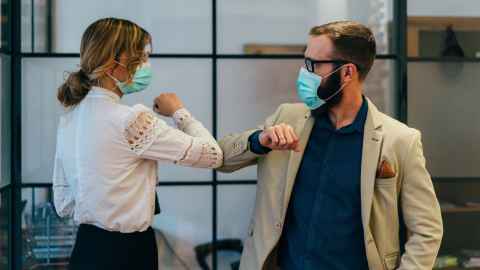COVID-19 and a new world etiquette
19 March 2020
Opinion: New Zealand can show the world how to both maintain social connection and keep ourselves safe during the COVID-19 crisis, writes Tanisha Jowsey.

A month ago a colleague told me that research shows humans need about eight hugs each day for optimum wellbeing. That sounded right to me. Although I usually reach for more, especially from my children and wider whānau.
COVID-19 offers a new lens through which to view hugs. Hugs are now potentially dangerous. I’m no longer hugging friends because I love and value them. In the space of a month, my embodied cultural ways of being in society have taken a complete u-turn. We didn’t hongi in our powhiri at university last week. Should we cough into our elbows and then minutes later have an ‘elbow shake’? Is a raising of the eye-brows enough of a virtual hug for us to feel connected to those we care about?
A student informed me last week that “new social etiquette is for the first person to bow and the second to curtsy, regardless of gender”. Upon which, he bowed and I curtsied. In that moment I wondered whether folk dancing might also come back into vogue.
As an anthropologist of 20 years, I’ve studied all manner of cultures. For the past few years I’ve been researching cultural change concerning teamwork and communication in New Zealand operating theatres. How operating theatres change culture can be difficult to measure and ascertain. But I can clearly see that rapid cultural change is occurring in New Zealand society in relation to the pandemic.
This rapidness is evident in how many hugs I’ve had today (N = zero). I see it at the hospital and in my university where there is hand sanitiser on every corner and people in these spaces are walking around rubbing sanitiser into their hands. I see people practising social distancing. Indeed, along with my teaching colleagues I’m scurrying to convert many of my face-to-face teaching sessions at the university into an online-accessible format.
We are making these changes so that we can slow down the spread of COVID-19 in New Zealand, and by slowing the spread we give our community the best chance of being able to look after those who need medical help when they need it. The intrinsic motivation is there. The cultural change is rapid. Hurray for New Zealand, we can rely on each other to effect fast and important change.
Are there elephants in this room though? We don’t want to panic anyone but these are quite suddenly dangerous times. What about the folk off a plane, ethnic discrimination, panic buying, job in/security? What about stigma and discrimination? Can we trust each other? Should we trust each other? I suggest we must. COVID-19 makes it evident that we are all in this together. My actions and in/actions impact others, as do yours.
Social research has for many years shown that trust and integrity are critical for combatting discrimination, and that acts of discrimination serve nobody. The way we greet and treat one another are pertinent exemplars of New Zealand culture which guide our sense of trust and connectedness. It’s important we find ways to maintain and strengthen trust and connectedness while limiting contagion.
Nancy Krieger at Harvard has shown that racial discrimination can increase your blood pressure and put you at higher risk of all manner of chronic and severe illnesses (2014). Long ago researchers in London (Scrambler and Hopkins, 1986), pointed out that a single act of discrimination against one person can be felt as discrimination by people who have things in common with them, sharing that person’s culture, illness, or social circle, for example.
My point here is that a single act of discrimination can be far-reaching for the individual and for society. Globally, we have witnessed some initial discriminatory behaviour associated with COVID-19 towards Chinese people (because the virus was first recognised in China). But it is clear that viruses do not discriminate and nor should we. It’s up to each of us to call out discrimination. Similarly, it’s up to us to model the kind of behaviour we know can curb the epidemic’s spread. We are agents of cultural change. Today. Right now.
As a nation, New Zealand has the opportunity to yet again lead the world with an example of how to respect and care for our community – our tangata – in ways that can reduce spread of COVID-19 while maintaining our sense of connectedness.
We must maintain hope and trust during rapid cultural change. We can do that in so many ways, sending friends encouraging emails and texts, giving people space, practising random acts of kindness. Let’s also bow and curtsy (and possibly even doh-see-doh).
Tanisha Jowsey is a senior lecturer at the Centre for Medical and Health Science Education at the School of Medicine.
This article reflects the opinion of the author and not necessarily the views of the University of Auckland.
Used with permission from Newsroom Covid-19 and a new world etiquette 19 March 2020.
Media queries
Alison Sims | Research Communications Editor
DDI 09 923 4953
Mob 021 249 0089
Email alison.sims@auckland.ac.nz